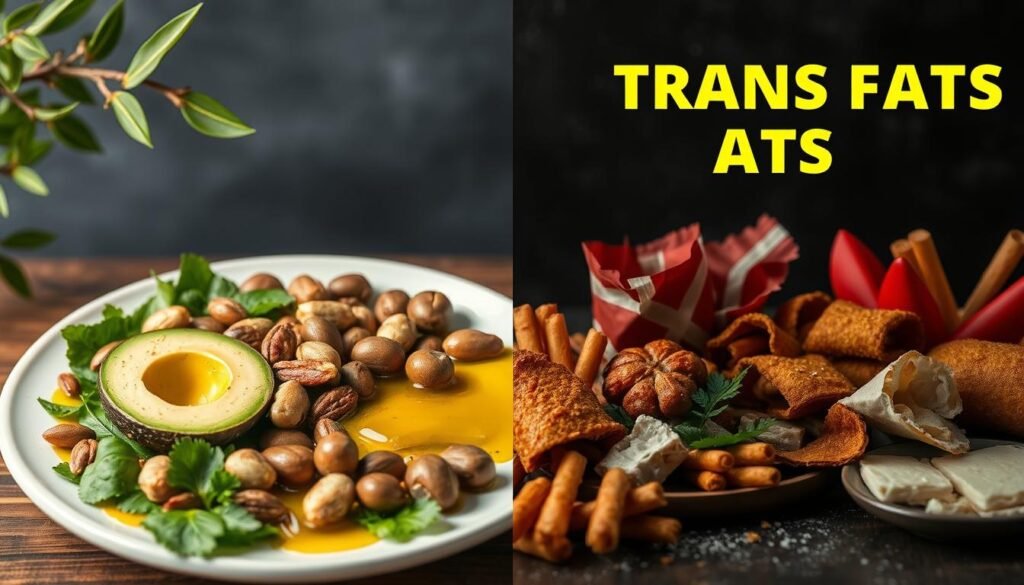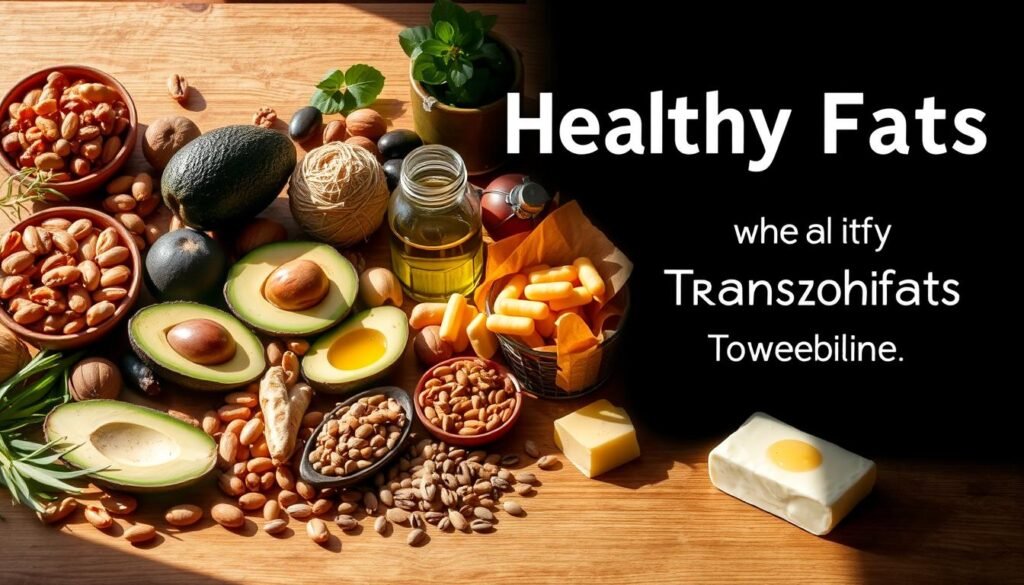Ever wondered how choosing between healthy fats and trans fats affects your cholesterol? It’s a big deal for your heart’s health. In today’s world, knowing the difference between healthy and trans fats is key for managing cholesterol. Healthy fats are important for your body and well-being. On the other hand, trans fats harm your health and raise your cholesterol. We aim to help you understand these fats better. This way, you can make choices that are good for your heart.
Key Takeaways
- Healthy fats are essential for maintaining good health and cholesterol levels.
- Trans fats are linked to negative health implications and increased cholesterol.
- Understanding the difference between healthy fats and trans fats can guide dietary choices.
- Making informed choices contributes to better heart health.
- Awareness of how fats affect overall health is crucial for long-term wellness.
Understanding Cholesterol and Its Role in Health
Cholesterol is a waxy substance present in all body cells. It aids in creating hormones, vitamin D, and digesting foods. Knowing about cholesterol is key to keeping the body working right.
Two main cholesterol types exist: LDL and HDL. LDL is the “bad” kind, which can clog arteries. This is risky for health. HDL, the “good” kind, helps take away LDL from the blood. This action cuts down heart disease risk.
It’s important to understand the LDL and HDL balance. What you eat affects this balance. A healthy diet can better your cholesterol levels. This helps lower the chances of issues from high LDL. Keeping cholesterol in check is crucial for health over time.
| Cholesterol Type | Common Name | Health Implications |
|---|---|---|
| LDL | Bad Cholesterol | Can lead to plaque buildup in arteries, increasing heart disease risk |
| HDL | Good Cholesterol | Helps remove LDL from the bloodstream, protecting heart health |
Healthy Fats vs. Trans Fats: What You Need to Know
It’s key to understand the difference between healthy fats and trans fats for good diet choices. This knowledge helps with heart and cholesterol health.
Defining Healthy Fats
Healthy fats include monounsaturated and polyunsaturated types. You can find them in avocados, nuts, seeds, and olive oil. They help your heart by lowering bad cholesterol levels.
Adding these fats to what you eat daily can boost your health. It helps keep cholesterol in check.
Identifying Trans Fats
Trans fats are in processed snacks, baked goods, and margarine, and they’re not good for you. They increase bad cholesterol and decrease good cholesterol, upping heart disease risk. Being aware of trans fats helps you choose healthier food.
For more info on the effects of different fats, check out healthy fats and trans fats.
| Type of Fat | Sources | Health Impact |
|---|---|---|
| Healthy Fats | Avocados, olive oil, nuts, fish | Lower LDL cholesterol, support heart health |
| Trans Fats | Processed snacks, baked goods, margarine | Increase LDL cholesterol, raise heart disease risk |
Benefits of Healthy Fats for Your Body
Healthy fats are key to staying well, touching different parts of our health. They keep our energy up and help our bodies use nutrients right. This part will dive into how healthy fats help our hearts and brains.
Supporting Heart Health
Eating healthy fats can lower the chance of heart problems. They make good cholesterol go up and bad cholesterol go down. Studies have found that eating fats like those in fish and olive oil instead of trans fats lowers heart risks. Important fats for the heart include:
- Monounsaturated fats from foods like avocados and olive oil
- Polyunsaturated fats, especially omega-3s from fatty fish like salmon and mackerel
- Plant oils, such as flaxseed oil and sunflower oil
Improving Brain Function
Healthy fats also help our brains work better, keeping our memories sharp and our thinking clear. They’re crucial for the brain’s structure and help nerve cells talk to each other. Fatty acids cut down inflammation, which may prevent brain diseases. Omega-3s can make you happier and protect against losing brain power. Foods like walnuts, flaxseeds, and fatty fish are great for your brain.
Adding more healthy fats to your meals can really boost your heart health and brain function. To understand more, read about the many benefits of healthy fats for eating well.
Risks of Trans Fats: What the Research Shows
Eating trans fats has caused a lot of concern over time, especially about health. Studies point out many risks of trans fats, like their link to heart disease. Knowing these effects is key to choosing what to eat wisely.
Links to Heart Disease
Research shows a strong link between trans fats and heart disease. Trans fats cause arterial plaque, which can lead to heart attacks and strokes. This shows why it’s important to eat less trans fat.
Other Health Concerns
Aside from heart issues, trans fats have other dangers. They may affect how your body uses insulin, causing type 2 diabetes. Also, trans fats can lead to inflammation, which brings on many chronic diseases. Knowing these risks helps us stay healthier.

The Difference Between Healthy and Trans Fats
It’s crucial to understand the difference between healthy and trans fats. This knowledge helps us make better eating choices. Healthy and trans fats are different in their makeup. This affects how our bodies use them and impacts our health.
Chemical Structure and Health Impact
Healthy fats are in foods like avocados, nuts, and olive oil. They have unsaturated carbon bonds. This helps improve heart health and lower cholesterol. On the other hand, trans fats have a chemical makeup changed by humans. This change makes it hard for our bodies to handle these fats well. Eating trans fats can lead to higher bad cholesterol and trigger inflammation.
How They Are Metabolized
Healthy and trans fats are metabolized differently. Healthy fats support our metabolism. They help with absorbing nutrients and making energy. Trans fats, however, mess up our normal metabolism. They can cause fat to build up in cells and may lead to metabolic issues.
| Aspect | Healthy Fats | Trans Fats |
|---|---|---|
| Chemical Structure | Unsaturated carbon bonds | Partially hydrogenated oils |
| Health Benefits | Supports heart health, reduces cholesterol | Increases risk of heart disease |
| Metabolism | Facilitates energy production | Disrupts normal metabolic processes |
Importance of Choosing Healthy Fats
It’s very important to choose healthy fats for your well-being. These fats help keep your cholesterol at healthy levels. This is key for a healthy heart. Choosing the right fats is good for your heart and helps keep your diet balanced.
Impact on Cholesterol Levels
Foods like avocados, nuts, and olive oil have healthy fats. These fats boost your “good” cholesterol, HDL, and lower “bad” cholesterol, LDL. It’s important for keeping your cholesterol in check.
Overall Dietary Balance
Adding healthy fats to your meals helps balance your diet. They make meals more nutritious and filling. A diet with lots of healthy fats improves the absorption of vitamins.

| Type of Fat | Effect on Cholesterol | Sources |
|---|---|---|
| Healthy Fats | Raises HDL, Lowers LDL | Nuts, Olive Oil, Avocados |
| Trans Fats | Lowers HDL, Raises LDL | Processed Foods, Fried Foods |
Sources of Healthy Fats You Can Include in Your Diet
Adding healthy fats to daily meals helps with overall health. Picking the best sources can improve nutrient levels and help the body in many ways. Here, we talk about great options for a balanced diet.
Nuts and Seeds
Nuts and seeds are rich in nutrients and healthy fats. Think of almonds, walnuts, chia seeds, and flaxseeds. They bring healthy fats, along with fiber and protein, to snacks or meals, making your diet more complete.
Oils: Olive, Avocado, and Others
Healthy oils are key for cooking and preparing food. For example, olive oil and avocado oil are full of good fats, especially monounsaturated fats. Using these instead of saturated fats helps your heart and nutrition.
Fatty Fish and Other Proteins
Fatty fish like salmon, mackerel, and sardines are high in omega-3s, important for heart and brain health. They fit well into meals as a protein choice. Other protein sources, such as grass-fed beef and free-range poultry, also offer good fats.
| Food Source | Type of Healthy Fat | Health Benefits |
|---|---|---|
| Almonds | Monounsaturated Fats | Heart health, weight management |
| Chia Seeds | Omega-3 Fatty Acids | Improves brain function, reduces inflammation |
| Olive Oil | Monounsaturated Fats | Anti-inflammatory, improves cholesterol levels |
| Salmon | Omega-3 Fatty Acids | Supports cardiovascular health, brain function |
Choosing the right healthy fats adds flavor and boosts health. Including nuts, seeds, healthy oils, and fatty fish leads to benefits. For more about healthy eating, check this resource.
How to Avoid Trans Fats in Your Diet
Keeping a healthy diet is important for your overall health. Knowing how to steer clear of trans fats is key. By choosing wisely and cooking smart, you can look after your heart.
Reading Nutrition Labels
Reading nutrition labels is key when buying food. Look for “partially hydrogenated oils” in the ingredients. These are trans fats. Even items with “zero grams of trans fats” may actually have some. To eat better, pay close attention to labels. Learning about nutrition labels helps you pick healthier options.
Cooking Tips and Alternatives
Simple cooking changes can cut out trans fats. Try using oils like olive or avocado instead. Fresh ingredients and whole foods are best. They have less trans fats compared to processed foods. If you’re baking, use applesauce or mashed bananas instead of margarine. Such swaps can make your meals better and healthier.

| Cooking Methods | Suggested Healthier Alternatives |
|---|---|
| Frying | Oven baking or air frying |
| Baking with Margarine | Using avocado oil or unsweetened applesauce |
| Using Processed Sauces | Making homemade dressings with olive oil |
| Using Pre-packaged Snacks | Choosing fresh fruits and nuts |
By following these tips, everyone can learn to dodge trans fats better. It’s good for the heart and boosts overall health.
Making Better Choices for Overall Health
Eating healthy fats daily is key for better health. Planning meals is important to eat the right fats while avoiding the bad ones. Preparing your meals helps improve nutrition and overall health.
Meal Planning with Healthy Fats
Meal planning lets people easily add healthy fats to their diet. For instance, they might choose:
- Avocado spread on whole-grain toast
- Salad topped with nuts and seeds
- Oily fish like salmon in various recipes
- Cooking with olive or coconut oil
This way, meals are both tasty and good for you. It helps stay away from unhealthy fats.
Consulting with Nutrition Experts
Getting advice from nutrition experts is smart. Registered dietitians can tailor meal plans and give helpful tips. They explain the benefits of different foods and how to use them daily.
Meal planning and expert advice lead to a healthy diet. Embracing healthy fats improves wellness and energy levels.
Conclusion
Knowing the difference between healthy fats and trans fats is key for good cholesterol health. This overview on fats shows how food choices greatly affect well-being. By adding healthy fats to meals, people can better manage cholesterol and lower disease risk.
Healthy fats do more than just help the heart. They positively affect overall health. To learn more about healthy vs. unhealthy fats, check here. This can help you understand their impact better.
Starting to live healthier begins with knowing about the fats we eat. Choosing healthy fats over trans fats leads to better health for us and our families. Making these choices puts us on the path to a healthier life.